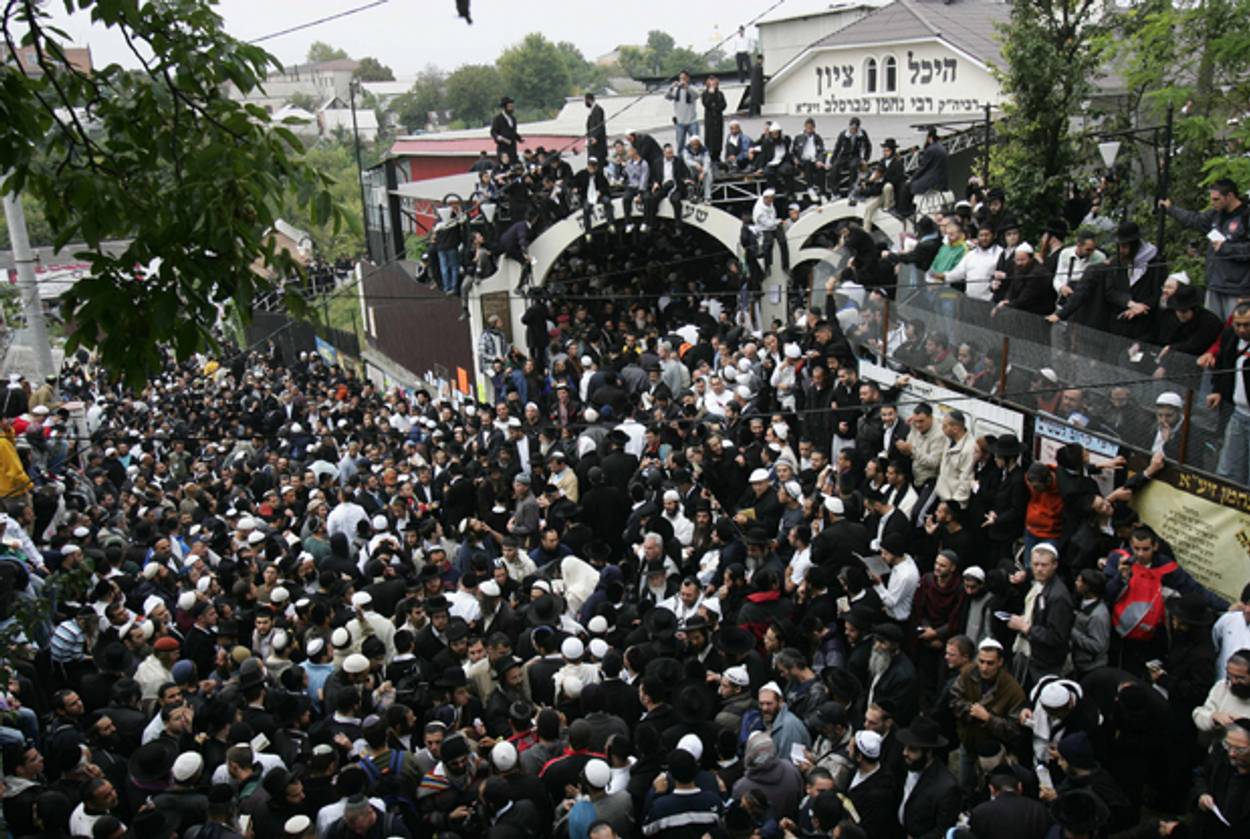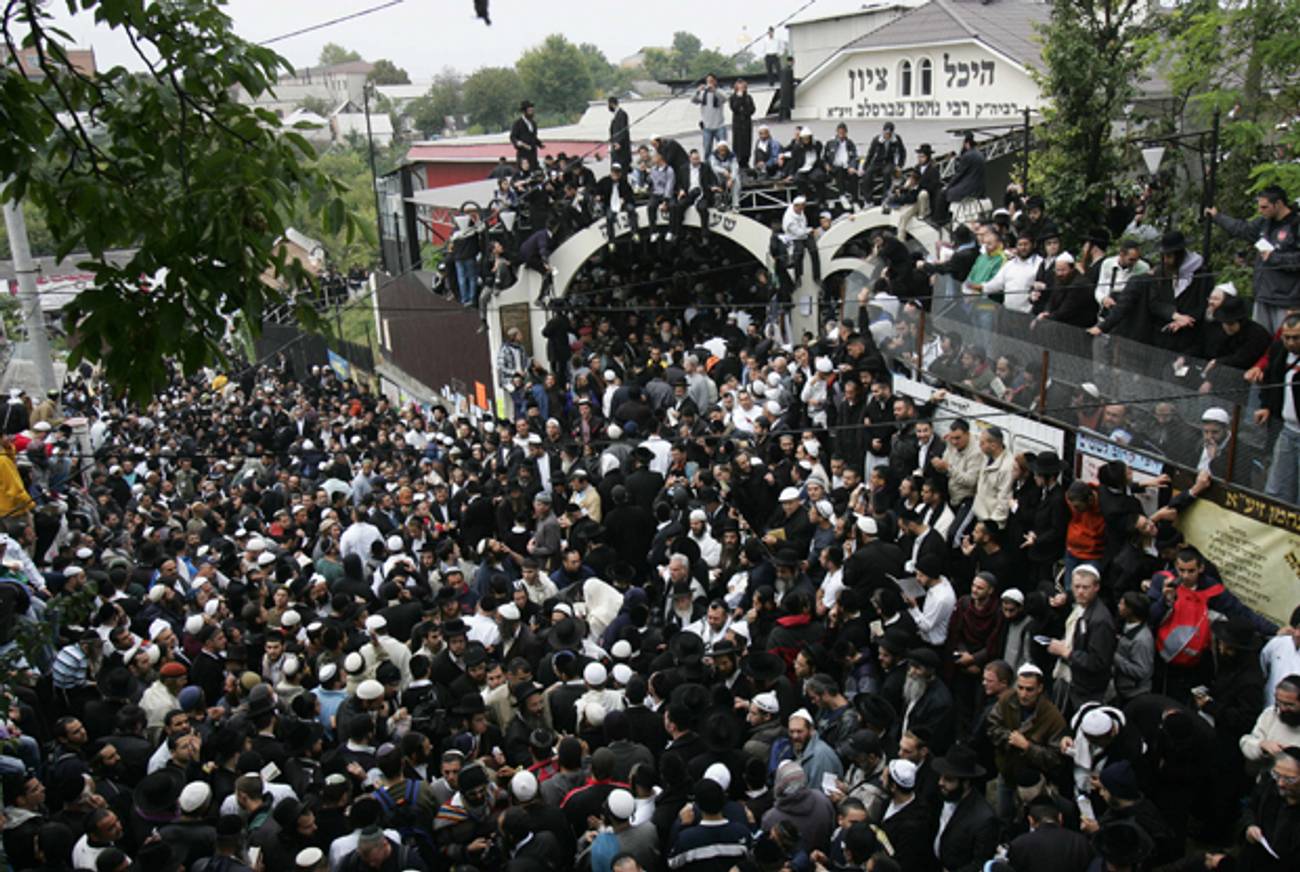Tensions Build in Advance of Hasidic Pilgrimage
A large cross installed without permits at the site of a mass Rosh Hashanah pilgrimage was recently vandalized with Hebrew graffiti pledging vengeance




Flying from Kiev to London last week, I sat next to an ultra-Orthodox American man traveling back to the United States after visiting Uman, Ukraine, with his wife and infant son. Uman, a town located halfway between Kiev and Odessa, is where 18th century tzaddik Rabbi Nachman of Breslov is buried and has become the site of an annual Rosh Hashanah pilgrimage made by tens of thousands of Hasidim, and my seatmate was worried about the upcoming gathering.
That’s because earlier this summer, a large crucifix was erected near the grave, marking the 1,025th anniversary of the mass conversion to Christianity in the medieval Kingdom of Kievan Rus, sparking an immediate outcry from Hasidic visitors. The cross, installed by the Commmitee for Public Organizations of Uman, was defaced last week with graffiti promising, in Hebrew, “To exact vengeance on the gentiles,” demanding they “stop desecrating the name of God.”
“They put it up two months before our pilgrimage for a reason and the cross should be moved,” my seatmate told me. “When 40,000 of our guys come in next month, there will be 40 or 400 or maybe even 4,000 among them who are willing to do something to the cross and it will only take one to ignite the fire. This is bad for everyone, and it will only end with someone getting hurt.”
The annual pilgrimage to Nachman’s gravesite is the Burning Man festival of Hasidic Jewry. The pilgrimage includes no less dancing or mystical frolicking than its pagan equivalent, and here too the ascetic pilgrims live in tents, prepare their own food, and perform rituals incomprehensible to local residents. Not surprisingly, large-scale antagonisms with the local population have built up over the years.
What began as a slow trickle of clandestine visitors to the site during the waning years of the Soviet Union in the 1980s has morphed, over the last decade, into an annual inundation of Hasidic visitors. There are now far more pilgrims then the town can accommodate, which has caused tension with the locals. A massive hospitality industry has sprung up to cater to the tens of thousands of visitors with kosher restaurants and Jewish-owned hotels taking over large swaths of the Pushkinskaya neighborhood. The overcrowding wasn’t helped by Israel and Ukraine reciprocally dropping their visa requirements last year.
In previous years, members of the Hasidic community have given violent chase to a pair of local thieves. Disputes about Ukrainians from outside the town being hired to work in the kosher kitchens have exacerbated local sentiment that the pilgrims are not ‘real tourists,’ as they do not frequent the town’s own restaurants. In 2009, attempts by police to shutter unlicensed food stalls, set up for the visitors, that violated local health codes were met with riots. The next year a business dispute between an Israeli and a Ukrainian man led to the fatal stabbing of the Israeli. Accusations of Ukrainian anti-Semitism are countered by the locals’ criticism of the Hasidim’s rowdy and disruptive behavior.
Ukraine’s widely respected chief rabbi, Yaakov Dov Bleich, has referred to the installation of the cross as a provocation, though not before going to great lengths to demonstrate the “Jewish respect for the Ukrainians’ right to set up symbols of Christian worship on their territory.” His subsequent pleas to the city authorities to reach a resolution foundered on political expediency and intransigence.
The secretary general of Uman’s city council has pointed out that the cross was installed without any of the relevant permits and, further, that it was unclear why the organizers had chosen to place it directly next to the small pond where the pilgrims pray and perform their rituals. The city’s deputy mayor’s attempt at brokering a compromise by moving the cross and building a few extra Christian monuments around the city were soundly rebuffed by the activists, who threatened retaliation against the gravesite if anything were to happen to the cross.
The restoration of the right of religious pilgrimage after the collapse of the Soviet Union is just one of many historical triumphs of freedom over totalitarianism. But if the escalating situation isn’t defused by competent authorities in the next few weeks, it might very well lead to another Ukrainian tradition: pogroms.
Vladislav Davidzon is Tablet’s European culture correspondent and a Ukrainian-American writer, translator, and critic. He is the Chief Editor of The Odessa Review and a Non-Resident Fellow at the Atlantic Council. He was born in Tashkent, Uzbekistan, and lives in Paris.